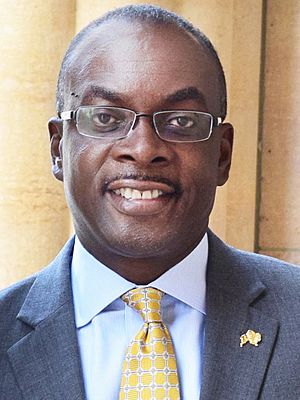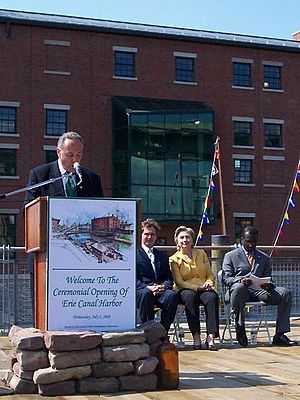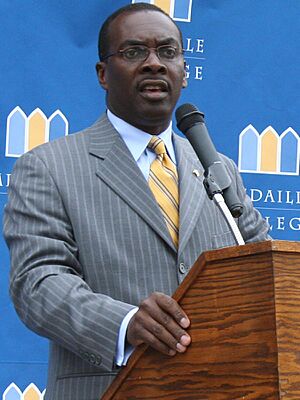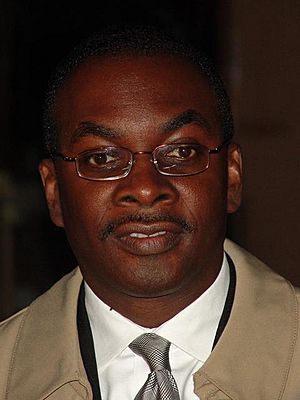Byron Brown facts for kids
Quick facts for kids
Byron Brown
|
|
|---|---|
 |
|
| Chair of the New York Democratic Party | |
| In office May 23, 2016 – January 14, 2019 |
|
| Preceded by | Sheila Comar |
| Succeeded by | Jay Jacobs |
| 62nd Mayor of Buffalo | |
| In office January 1, 2006 – October 15, 2024 |
|
| Preceded by | Anthony Masiello |
| Succeeded by | Christopher Scanlon (acting) |
| Member of the New York Senate from the 60th district |
|
| In office January 8, 2003 – December 31, 2005 |
|
| Preceded by | Mary Lou Rath |
| Succeeded by | Marc Coppola |
| Member of the New York Senate from the 57th district |
|
| In office January 1, 2001 – January 8, 2003 |
|
| Preceded by | Al Coppola |
| Succeeded by | Patricia McGee |
| Member of the Buffalo Common Council from the Masten district |
|
| In office January 1, 1996 – January 1, 2001 |
|
| Preceded by | David Collins |
| Succeeded by | Antoine Thompson |
| Personal details | |
| Born |
Byron William Brown
September 24, 1958 New York City, New York, U.S. |
| Political party | Democratic (1995–present) Buffalo Party (2021) |
| Spouse | Michelle Austin |
| Children | 1 |
| Education | Buffalo State College (BA) |
Byron William Brown II (born September 24, 1958) is an American politician. He was the 62nd mayor of Buffalo, New York. He served from 2006 until he resigned in 2024. He was Buffalo's first African-American mayor and the longest-serving mayor. Before becoming mayor, he was a member of the New York State Senate and the Buffalo Common Council.
Brown grew up in Queens, New York. He became a leader after working in many different political jobs. He started as an assistant to local leaders. These included the Buffalo Common Council and the New York State Assembly. He also worked as the Director of Equal Employment Opportunity for Erie County.
In 2001, Brown made history. He was the first African-American politician elected to the New York State Senate from outside New York City. He was also the first minority person to represent a state senate district that was mostly white.
He was elected Mayor of Buffalo in 2006 and won re-election several times. In 2021, he lost the Democratic primary election. However, he won the general election as a write-in candidate. He announced his resignation in September 2024. His resignation became official on October 15, 2024. Christopher Scanlon is now the acting mayor.
Contents
Early Life and School
Brown grew up in Hollis, New York. His family shared a duplex home with his grandparents. His grandparents were immigrants from the Caribbean island of Montserrat. He still has many relatives living in the area. As a kid in Queens, he was a fan of the New York Mets and New York Knicks sports teams.
Brown was a Boy Scout at Hollis Presbyterian Church. He was also active at the Central Queens YMCA. He went to Public School 134 and PS 109 for junior high. He attended August Martin High School, where he played the trumpet in the band. Byron and his sister, Andrea, were the first in their family to go to college.
After high school, Brown went to Buffalo State College. He played junior varsity basketball for one year as a guard. He thought about a career in medicine. But he graduated in 1983 with degrees in political science and journalism. Later, he completed a special program for government leaders at Harvard University's John F. Kennedy School of Government.
Early Career in Public Service
After college, Brown worked for Bristol-Myers as a sales representative for a year. He then became the Chief of staff for Buffalo Common Council President George Arthur. He held this job for two years. Next, he worked for Erie County Legislator Roger Blackwell for two years. He also spent two years working for Arthur Eve, who was the Deputy Speaker of the New York State Assembly.
After these roles, he worked for eight years. He was the director of the Erie County division of the Equal Employment Opportunity Commission. He left this job in July 1993 to run for public office.
During his early career, Brown joined Grassroots. This was a political group started in 1986 by neighborhood leaders. Brown eventually became a vice president of this organization.
Ebony magazine recognized Brown in November 1989. They named him one of the "30 Leaders of the Future." In 1991, the Buffalo Chapter of the Southern Christian Leadership Conference gave him the Martin Luther King Jr. Award for community service. He also received other awards for his leadership and community work.
In 1992, Brown was a delegate for the 1992 Democratic National Convention. He first supported Bob Kerrey for president. But when Kerrey left the race, Brown switched his support to Bill Clinton. In 1993, Brown was invited to attend Bill Clinton's Presidential Inauguration.
First Steps in Elected Office
Brown first ran for public office in 1993. He sought a seat on the Erie County Legislature but did not win.
In September 1995, Brown won the Democratic primary for the Masten District Buffalo Common Council seat. He then attended the Million Man March in October 1995. Brown won his seat on the Buffalo Common Council by defeating David Collins. He won by a large margin in the November 7, 1995, general election. He was re-elected easily in 1997 and 1999. Starting in January 2000, Brown was part of the first-ever African-American majority on the Buffalo Common Council.
In 1996, The Buffalo News called Brown "Buffalo's Julian Bond." In 1999, the newspaper described him as "bright, creative and hardworking."
Serving in the State Senate
In 2000, Byron Brown ran for the New York State Senate. He competed for the 57th District Democratic nomination. He won the primary election by a wide margin. When he was sworn in on January 1, 2001, Brown became the first African-American State Senator elected from outside New York City. He was also the first minority member to represent a majority-white district in the New York State Senate.
During his time in the State Senate, the Democratic Party was in the minority. Brown supported Governor George Pataki's plan in 2001. This plan was to build up to three casinos on Seneca Indian land in Western New York. This was a new idea because it allowed slot machines for the first time in New York State. Brown believed the casinos would help the local economy.
By 2003, Brown was seen as a rising political star. People thought he might run for Lieutenant Governor of New York or become Buffalo's first black mayor. By 2004, it was clear he was interested in the mayor's office.
Becoming Mayor of Buffalo
In February 2005, Brown announced he would run for Mayor of Buffalo. On April 29, 2005, Mayor Anthony Masiello said he would not seek another term. Six candidates, including Brown, entered the race. Brown gained many endorsements and support from labor unions.
New York Attorney General Eliot Spitzer said helping Brown win was his "biggest campaign priority." Brown won 59% of the vote in the Democratic primary on September 13, 2005. He then faced Kevin Helfer in the general election. Brown was the sixth African-American to win the Democratic primary for mayor in Buffalo since the 1960s. However, the others had not won the general election. Buffalo had not elected a Republican mayor since 1961. Brown raised much more money than Helfer. He defeated Helfer 64% to 27% in the general election.
First Term as Mayor

Brown became mayor on December 31, 2005. On his first day, he visited the Buffalo Waterfront. He wanted to show his commitment to developing the area. Restoration of where the Erie Canal met the Great Lakes began soon after. The Erie Canal Harbor officially opened on July 2, 2008.
In 2006, the Seneca Nation planned to build a third casino. Brown was unsure about this casino at first. He wanted to make sure it would bring tourists, not just take money from local residents. In October 2006, the Seneca Nation and Brown agreed on terms for the casino. The casino opened on July 3, 2007.
Fighting Crime and Poverty
Brown joined other mayors from across the U.S. to fight illegal gun use. They met with mayors like Michael Bloomberg and Thomas Menino. They signed a plan to punish gun crimes and stop illegal gun sales. This group, the Mayors Against Illegal Guns Coalition, grew to include many city leaders. Brown learned techniques that helped reduce Buffalo's homicide rate by 21%.
Brown's first year as mayor had mixed reviews. People praised his changes to city hall and his follow-through on projects. But crime issues and the casino plans were challenging. By January 2009, Brown reported that crime had fallen 12% and homicides by 50% since he took office.
Buffalo has many vacant properties. In 2007, Brown started a $100 million plan to tear down 5,000 empty houses. This was about half of the city's vacant homes. Abandoned houses cost the city money in lost taxes and cleanup. Also, many fires and arsons happen in vacant buildings. This plan aimed to improve the city.
In 2008, Brown brought a real-time wireless video surveillance system to Buffalo. The city installed 56 cameras. This system was put in place after Brown asked the city to look at surveillance cameras in other cities.
Public Relations
On June 13, 2008, Tim Russert, a famous Buffalo native, passed away. Brown ordered all flags on city property to be lowered to half-staff to honor him. This was unusual for a civilian, but Brown called Russert "one of Buffalo's finest ambassadors."
In 2019, Buffalo won the Golden Snowball Award. This award goes to the Upstate New York city with the most snowfall. Brown refused to claim the trophy. He said he "did not see the contest as 'a real contest'."
Second, Third, and Fourth Terms
Brown won re-election for his second term in 2009. He won the Democratic Primary by a large margin. There were no other major candidates, so he won the general election easily.
He was also elected for a third and fourth term, winning both elections by a good margin. During these terms, he worked to get a new Amtrak station for Buffalo. He also announced changes to the Buffalo Police Department after an incident between protesters and police during the George Floyd protests. He oversaw a period of growth in Buffalo. This growth happened after the Buffalo Billion program was passed.
In 2016, Brown led the creation of the Buffalo Green Code. This plan changed the city's zoning rules. It removed minimum parking requirements in many areas.
2021 Mayoral Election
In 2021, Brown ran for an unprecedented fifth term as mayor. However, he was defeated in the Democratic primary on June 23, 2021, by India Walton. During the primary campaign, Brown chose not to participate in debates.
After losing the primary, Brown announced he would run as a write-in candidate in the general election. The Erie County Democratic Committee supported India Walton. So, Brown relied on support from local Republican officials and other groups who did not support Walton. They helped him gather signatures to get on the ballot as an independent.
On August 17, 2021, Brown's campaign submitted about 3,000 signatures. He wanted to appear on the ballot with the party label "Buffalo Party." However, the Erie County Board of Elections said the petitions were not valid. Brown sued to get on the ballot. But on September 16, 2021, courts ruled against him. This meant he would continue his campaign as a write-in candidate.
In the general election on November 2, Brown was re-elected. He won 58.8% of the vote as a write-in candidate. Brown called his victory "one of the greatest comeback stories in our history." He said his win was a rejection of ideas like "defund the police" and "socialism."
Brown received endorsements from several important figures. These included U.S. Representative Tom Suozzi and former mayor Anthony Masiello. He also had support from The Buffalo News and local police unions.
Resignation from Office
Byron Brown held a press conference on September 30, 2024. He announced that he would resign from his position as mayor. He was leaving to become the president and CEO of Western Regional Off-Track Betting. His resignation became effective on October 15, 2024. Christopher Scanlon, who was the president of the Buffalo Common Council, is now serving as acting mayor. He will serve until the next mayoral election in November 2025.
Personal Life
Byron Brown is married to Michelle Austin. They have a son, Byron III, who is sometimes called Byron Jr. Byron III enjoys basketball. He played for City Honors School and attended high-level youth basketball camps.
The Brown family attends St. John Baptist Church. As mayor, Brown performed wedding ceremonies at the church. Byron Brown is a chapter president of the Alpha Phi Alpha fraternity. He was also a past President of the Buffalo State College Alumni Association Board. At the time he became mayor, he was on the Board of the Boy Scout Council of Western New York.
Brown collects tropical fish and kept an aquarium in his Buffalo Mayor's office. His parents divorced. At the start of his time as mayor, his mother lived in Buffalo. He is also a member of the Erie County Democratic Committee. He was a delegate to the Democratic National Convention in 1992, 2000, and 2004.
Images for kids
See also
 In Spanish: Byron Brown para niños
In Spanish: Byron Brown para niños
 | Claudette Colvin |
 | Myrlie Evers-Williams |
 | Alberta Odell Jones |




